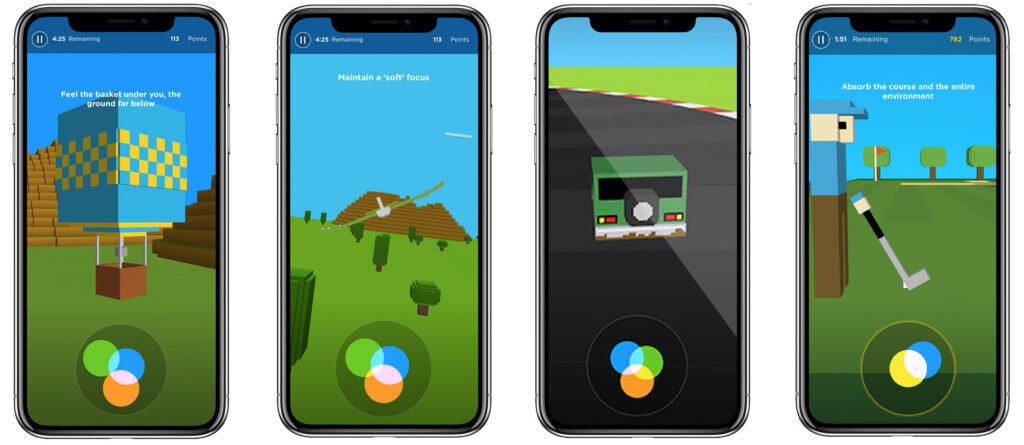Mind-Body Connection: The Benefits of Meditation
With the world, and its stressors, accessible in the palm of your hand, it can be hard to remain present. However, just as the number of distractions in everyday life has grown, so too has the popularity of mindfulness meditation. Here, we discuss the numerous benefits of mindfulness meditation and how Versus can be a valuable tool in your practice of meditation.
What is mindfulness meditation?
Mindfulness meditation is a practice which may include mental imagery and regulated breathing, as well as relaxation and awareness of the body (Mineo, 2018). The goal of mindfulness meditation is to quiet external distractions, worries, and pressures, and to simply experience your thoughts and feelings in the current moment (Mineo, 2018).
What are the benefits of mindfulness meditation?
A growing body of research indicates that mindfulness meditation may have a profound positive impact on mental and physical health.
Stress, anxiety, and depression
Studies suggest that meditation may relieve stress and reduce the symptoms of anxiety and depression (Sood and Jones, 2013). Meditation is believed to aid practitioners in achieving these outcomes in several ways.
Firstly, mindfulness meditation has been shown to help individuals quiet repetitive thoughts, especially those that are stressful or unpleasant (Ramel et al., 2004). By decreasing ruminative thinking, meditation can assist individuals in falling asleep faster and staying asleep longer (Martires and Zeideler, 2015), which may also reduce feelings of anxiety (DiSalvo, 2018).
In addition, meditation is believed to increase positive affect in practitioners (Davidson et al., 2003). Furthermore, over the long-term, people who meditate tend to have greater brain volume in areas associated with emotional regulation and self-control than do individuals who do not meditate (Luders et al., 2009). An improved ability to self-regulate may help individuals better manage their anxiety and depression (Luders et al., 2009).
Cardiovascular health
Chronic stress, anxiety, and depression can cause substantial damage to sufferers’ physical health (Krantz et al., 2013). When people are stressed, they produce inflammatory hormones, which can result in cardiovascular strain (Mohney, 2018). Therefore, by helping individuals manage their stress and anxiety levels, mindfulness meditation may lower blood pressure and decrease the risk of heart disease (Koike and Cardoso, 2014).
Pain and illness
Research indicates that meditators tend to have a stronger immunity to illness than non-meditators (Davidson et al., 2003). They also tend to have greater activity in the areas of the brain associated with pain management, which may make them less sensitive to physical pain than non-meditators (Zeidan et al., 2011).
Attention and memory
Even short periods of mindfulness meditation have been demonstrated to improve participants’ ability to sustain attention, resulting in increased productivity (Zeidan et al., 2011). Additionally, studies suggest that meditation may improve working memory, even among those already experiencing memory loss (Innes et al., 2018).
By adopting the simple practice of mindfulness meditation, individuals may be able to drastically improve their quality of life. Continue below to discover how Versus can help you learn and stay committed to mindfulness meditation.
How can Versus facilitate meditation?
Versus uses mobile devices for good by incorporating principles of mindfulness meditation into a user-friendly platform. Although Versus is not exclusively designed for meditation, on its own or in conjunction with other tools it can be incredibly useful in practicing this skill.
The Versus headset reads your brain activity (EEG) – it identifies when your mind is overactive, distracted, or strained. When you are on a Stress Performance Protocol, the goal of the Versus exercises is to teach you strategies to quiet your mind, avoid repetitive thoughts and overthinking, and enter into a state of calm awareness.
Versus takes the guesswork out of meditation. With helpful suggestions, combined with visual and audio feedback, the Versus app guides you toward the Optimal Zone for relaxation, which resembles a meditative state. As you get closer to a state of calm awareness, the three circles at the bottom of the screen will converge and you will have greater success in the exercises. If you become drowsy, anxious, or distracted, the circles will move apart and you will perform worse in the exercises.
On a Stress Performance Protocol, when all three circles in the app are entirely converged, a gold ring will appear around them. This indicates that you have entered the Optimal Zone. By notifying and rewarding you when you enter an optimally relaxed brain state, Versus is designed to teach you how a meditative state feels and how to recreate this state in your everyday life.
Since the Versus system is mobile, you can learn mindfulness techniques from the comfort of your own home or office. Combined with the gamification of the entire experience, this aspect of the Versus system helps make the practice of mindfulness mediation both easy and effective.
Please note: The Versus system is a wellness product designed to promote and encourage healthy lifestyle choices. It is not intended to diagnose, treat, or cure any medical condition. If you have any questions or concerns about a medical condition, you should consult with your physician.
References
Davidson, R., Kabat-Zinn, J., & Schumacher, J. (2003). Alterations in Brain and Immune Function Produced by Mindfulness Meditation. Psychosomatic Medicine, 65(4), 564-570. doi:10.1097/01.PSY.0000077505.67574.E3
DiSalvo, D. (2018). Understanding The Link Between Sleep And Anxiety, And Other Findings From The Neuroscience Of Sleep. Forbes, 14 Nov. Retrieved 5 Dec. 2018, from https://www.forbes.com/sites/daviddisalvo/2018/11/12/understanding-the-link-between-sleep-and-anxiety-and-other-findings-from-the-neuroscience-of-sleep/#65da87c836ae
Innes, K. E. et al. (2018). Effects of Meditation and Music-Listening on Blood Biomarkers of Cellular Aging and Alzheimer’s Disease in Adults with Subjective Cognitive Decline: An Exploratory Randomized Clinical Trial. Journal of Alzheimers Disease, 66(3), 947-970. doi:10.3233/jad-180164
Koike, M. K., & Cardoso, R. (2014). Meditation can produce beneficial effects to prevent cardiovascular disease. Hormone Molecular Biology and Clinical Investigation, 18(3). doi:10.1515/hmbci-2013-0056
Krantz, G., Thorn, B., Kiecolt-Glaser, J. (2013). How Stress Affects Your Health. American Psychological Association. Retrieved from https://www.apa.org/helpcenter/stress.aspx
Luders, E., Toga, A. W., Lepore, N., & Gaser, C. (2009). The underlying anatomical correlates of long-term meditation: Larger hippocampal and frontal volumes of gray matter. NeuroImage, 45(3), 672-678. doi:10.1016/j.neuroimage.2008.12.061
Martires, J., & Zeideler, M. (2015). The value of mindfulness meditation in the treatment of insomnia. Current Opinion in Pulmonary Medicine, 21(6), 547-552. doi:10.1097/MCP.0000000000000207
Mineo, L. (2018). Less stress, clearer thoughts with mindfulness meditation. Harvard News, 17 April. Retrieved 5 Dec. 2018, from https://news.harvard.edu/gazette/story/2018/04/less-stress-clearer-thoughts-with-mindfulness-meditation/
Mohney, G. (2018). Stress Costs U.S. $300 Billion Every Year. Healthline, 08 Jan. Retrieved from https://www.healthline.com/health-news/stress-health-costs#1
Ramel, W., Goldin, P. R., Carmona, P. E., & Mcquaid, J. R. (2004). The Effects of Mindfulness Meditation on Cognitive Processes and Affect in Patients with Past Depression. Cognitive Therapy and Research, 28(4), 433-455. doi:10.1023/b:cotr.0000045557.15923.96
Sood, A., & Jones, D. (2013). On mind wandering, attention, brain networks, and meditation. Explore, 9(3), 136-141. doi:10.1016/j.explore.2013.02.005
Zeidan, F., Johnson, S. K., Diamond, B. J., David, Z., & Goolkasian, P. (2010). Mindfulness meditation improves cognition: Evidence of brief mental training. Consciousness and Cognition, 19(2), 597-605. doi:10.1016/j.concog.2010.03.014




